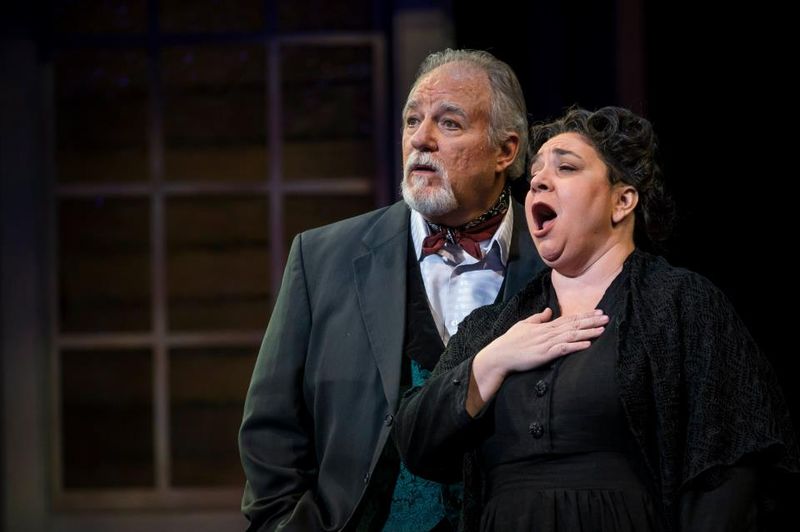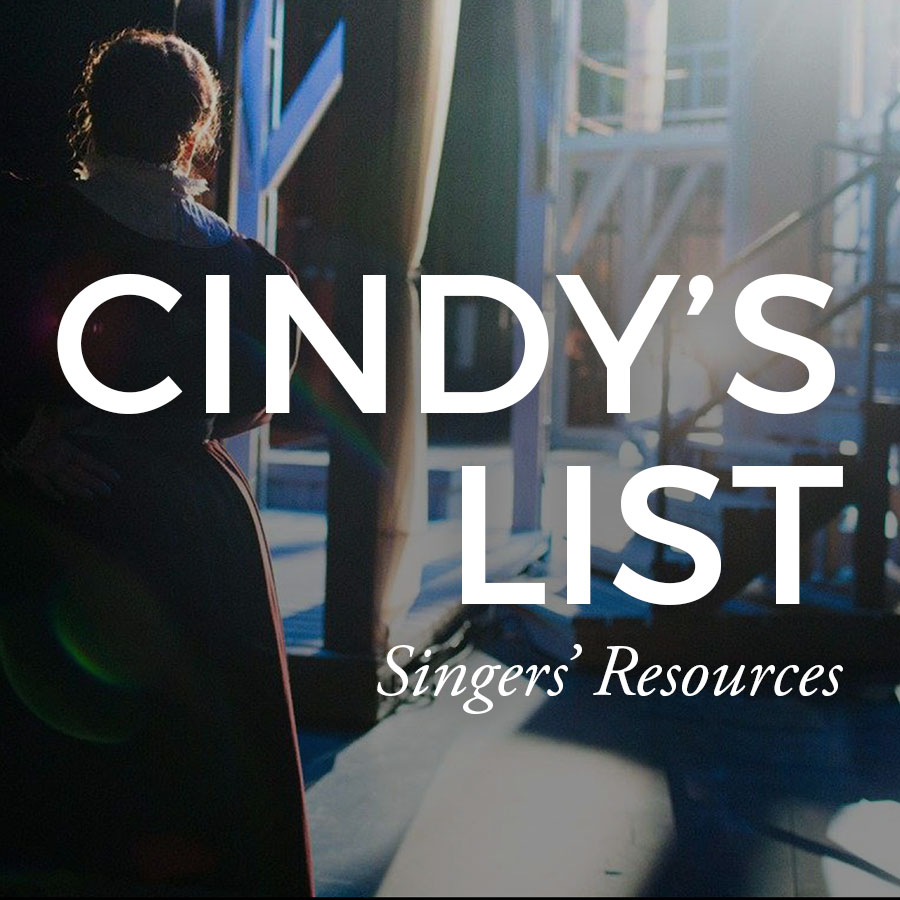Tonight, I am an unhappy, frumpy, controlling spinster. Tonight, I am terrified of losing my tiny corner of the world, and will resort to underhanded manipulation to try to hold on to it.Tonight, I will have a hair-pullin' chick fight with a six foot tall blonde bombshell, and lose.
Ho-hum. Just another day in the life of an opera singer. Tonight, we're opening Frank Loesser's highly operatic Broadway masterpiece, The Most Happy Fella, with Tulsa Opera; I'm making both a company and a role debut as Marie Esposito. If leading man Tony is the Most Happy Fella, his sister Marie is the Most Miserable Lady.
As Marie, with Kim Josephson as Tony, in The Most Happy Fella. Tulsa Opera 2013. Photo by Shane Bevel.
It's a terrific, highly tuneful show, with a magnificent cast; almost exclusively performed by opera companies these days because of the vocal requirements. I wasn't familiar with the show at all when I got the gig, but I liked it immediately. Marie took a little longer to get a grip on. I felt I understood her motivations, but her character is SO far from mine, and from the type I usually play, it's been a real acting challenge. But I think I finally figured out who she is.
Siobhan Finneran in her wonderful role as Miss O'Brien on PBS' Downton Abbey. Yes, I am a huge fan.
More or less. When I'm tackling a new character, I like to find other character "types" to relate to. It gives me roots from which to build. For instance, my Katisha (The Mikado) is a sort of combination of Norma Desmond and Miss Piggy. Marie does most of her nefarious work behind the scenes, just like Miss O'Brien. And just like O'Brien, it backfires.
It's always more fun to play the villain than the ingenue, not that I've ever played the ingenue. As in EVER. Even when I was young enough. Recently, my high school English teacher dug up some ancient photographic evidence of my early participation in the theater, and posted it on FaceBook. It's resulted in quite a walk down memory lane for those of us who were fortunate enough to be educated by Mrs. Marcia Hilsabeck (we called her Ma), and one Mr. Ford Ainsworth, our drama teacher and playwright, who I found out years later was also an opera fan.
As Cassandra in "The Walls of Troy" by Ford Ainsworth, with Patrick Barrett as Paris. I am 17 years old in this picture! And check my 80s' mullet perm ...
Mr. Ainsworth wrote many plays for us, among them a trilogy about the fall of Troy; we produced two of these plays while I was in school, and I played Hera (the wife of Zeus, and therefore Queen of the Gods, also a harridan) and Cassandra (young, but cray-cray). During my high school drama career I also played Mrs. Bramson in Night Must Fall by Emlyn Williams; Mrs. B is a fussy, mean old hypochondriac who is eventually murdered by a handsome drifter she takes in. I was cast in another of Mr. Ainsworth's plays (I forget the title) which we never produced --- it was about race relations and miscegnation in a small Texas town, which proved to be too hot a topic for MY small Texas town in the 80s; but my role once again was that of the officious and bigoted school board president. The point is, throughout my entire life, even before I was subject to the restrictions of Fach (that's voice type, to you civilians; opera singers can't just sing any old role, as each is written for a very specific Fach), I have been cast as witches, bitches, and crazy people; maids, nurses, motherly types; and occasionally, as older-but-still-glam characters. Mr. Ainsworth knew what he was doing. (By the way, of the people who were in that particular theater class, at least five I know of have gone on to have careers in the theater. That's a pretty good percentage for a small town high school).
It's an interesting commentary on society and art that when it comes to our entertainment, we have such specific ideas about what our romantic leads, our sidekicks, our bad guys, and so on should look like. Of course, there's more involved than looks; when it comes to opera, there's a very specific matter of the way singers sound as well (which sometimes overrules the laws about looks, although not nearly as often as it used to). Higher, lighter voices are invariably younger characters (or in the case of character tenors, sometimes very old) and heavier, darker ones are usually older. A big dramatic voice can be a lead, but usually of a very heroic nature rather than an ordinary person. I suppose it is the nature of theater to exaggerate certain qualities somewhat, to get the point across.
However, I do find it amusing that even when I was 17, I was playing (mostly) much older characters, and now I'm reaching the age of the characters I've been playing all my life. Does this mean that, moving forward, I get to be younger? Alas, not in this unjust world.
Oh, and by the way ... welcome to my new old blog.
Since about 2007, I've halfheartedly kept a blog on my professional website, but it's not often updated due to the technical hassle of doing so. I've decided to move it here, and when I figure out how to do so, I'll bring over the original content . At the same time, I'm ending The Next Hundred Pounds, my weight loss/fitness blog I've been writing since 2008. It's just time to move on. I'm not quite ready to give up the topic, though; more like I want to expand to a more general focus. So this blog is intended to encompass my life on and off the stage, in all its weird and wonderful twists and turns. Thanks for reading, and please stay tuned.








